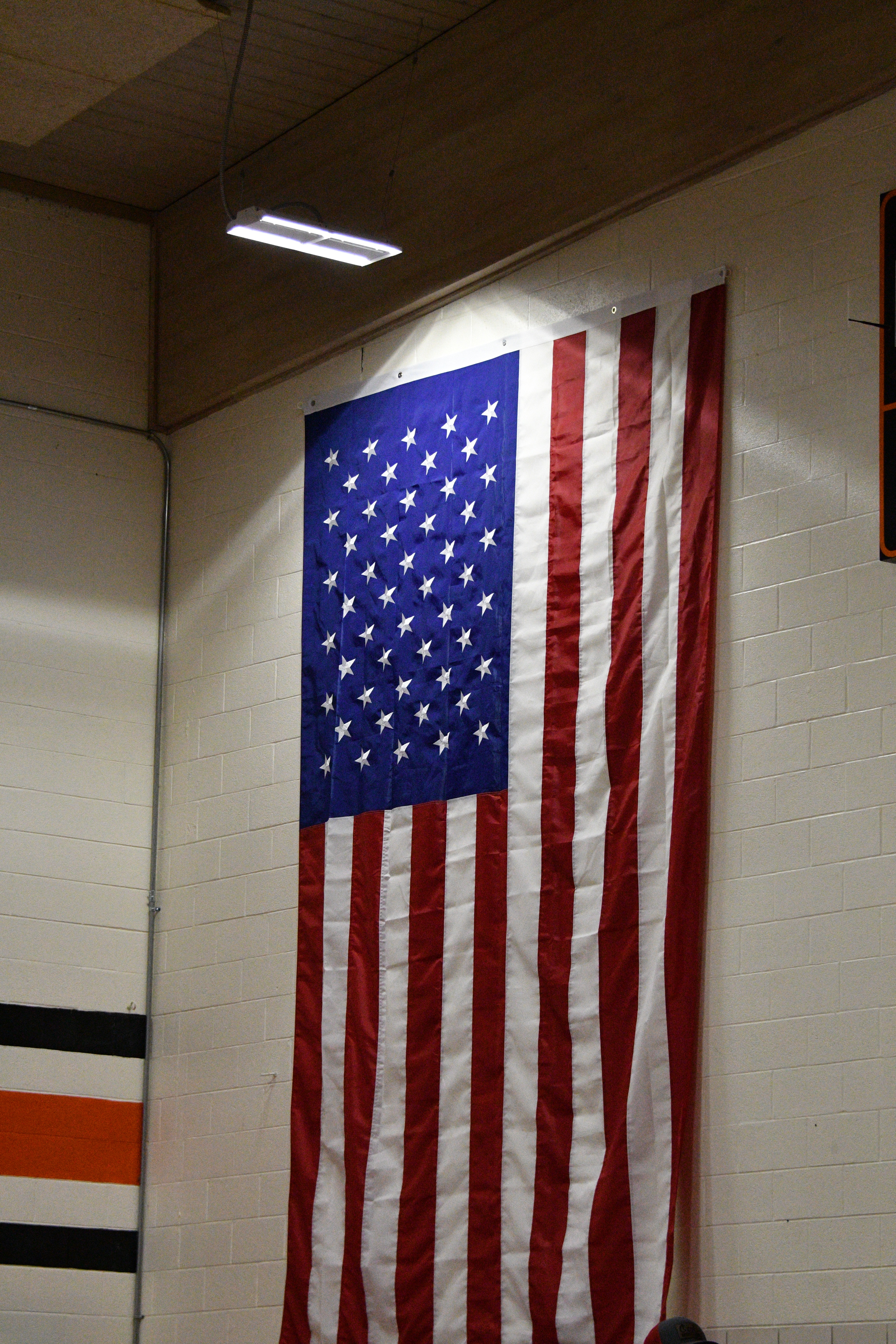In reading Senate Bill 238 — the proposed legislation by Sen. Gerald Allen, R-Tuscaloosa, that would ask the voters of Alabama whether the playing of the national anthem should be required in the state’s K-12 public schools — two things are immediately clear:
- If this is the political agitation it appears to be, it’s not at all timely.
- There’s barely anything to this bill.
As to the first point, NFL quarterback Colin Kaepernick began his anthem protests all the way back in August 2016, almost some seven years ago, which is an eternity in rage-baiting politics. Perhaps Allen is merely feeling patriotic, but for a man who crusaded against books by gay authors, sought to protect the state from the creeping dread of Sharia law and just this week nearly torpedoed efforts to save the I-65 rest stop rocket on account of his love for dead Confederate trash, it seems as if the senator is well versed in the sort of hollow outrage that plays so well in Alabama. But come now, Sen. Allen, in 2023, we’ve moved on to attacking drag performers and transgender people — try to keep up.
(And Allen may not be done with Trojan horse legislative efforts. On Tuesday, he introduced SB 270, a bill that would require the installation of a John Lewis statue at the Edmund Pettus Bridge. But SB 270 is a carbon copy of SB236, which was filed last month by Sen. Rob Stewart, D-Selma.)
But in squaring up only the text of Allen’s anthem bill and not whatever nefarious motivations he may have for introducing it, it’s surprisingly thin on what it actually contains. After beginning with some “legislative findings” that are lifted verbatim from a 2010 federal law directing the U.S. Mint to issue “Star-Spangled Banner” commemorative coins, the bill only specifies that the first verse of the anthem be played at least once a week and that schools must use either a recording from the Library of Congress website or commission a performance from the LoC’s collection of original sheet music.
Outside of those sparse provisions, there are no punishments specified for schools that object; no sanctions for institutions that opt for, say, a punk rock remix of the anthem or any number of other more pseudo-sacrilegious renditions. Furthermore, there’s no requirement that students or school staff stand or observe any other sort of reverence while the anthem plays — and really, if your aim is more grist for the rage mill, wouldn’t you want that in your nonsense bill?
Broadly speaking, even if Allen’s bill was more punitive or coercive, it would likely be constitutional, particularly in Alabama, which lies in a federal circuit jurisdiction with an important carveout where it comes to students and patriotic observances. While there has been little — if any — litigation regarding the national anthem in schools, there’s been plenty regarding the Pledge of Allegiance, beginning first with Jehovah’s Witnesses who objected to swearing an oath to anything but God and then by atheists who took issue with the inclusion of the phrase “under God” starting in 1954.
While the Supreme Court in 2004 sidestepped an Establishment Clause challenge to the Pledge (ruling only that a non-custodial atheist parent lacked the standing to sue on behalf of his child), cases decades earlier involving Witnesses established the boundaries of what a state could and couldn’t do when it came to requiring public school students to recite the Pledge. In 1940, the Supreme Court held that states could force students to say the Pledge — even upon penalty of expulsion — only to reverse itself three years later. In the latter case, 1943’s West Virginia State Board of Education v. Barnette, the Court found that a mandatory flag salute was an unconstitutional form of compelled speech, and in a moving and memorable opinion, cast doubt on any government-enforced displays of patriotism. “Those who begin coercive elimination of dissent soon find themselves exterminating dissenters,” wrote Justice Robert H. Jackson, clearly echoing the ongoing atrocities of World War II. “Compulsory unification of opinion achieves only the unanimity of the graveyard.”
Alabama’s own Justice Hugo Black authored an opinion with Justice William O. Douglas that spoke to the same principled ideas. “Words uttered under coercion are proof of loyalty to nothing but self-interest,” Black wrote. “Love of country must spring from willing hearts and free minds, inspired by a fair administration of wise laws enacted by the people’s elected representatives within the bounds of express constitutional prohibitions.”
(Lest we get too convinced of Black and Douglas’ commitment to liberty and freedom, it’s worth noting they both were on the side of the government in Korematsu v. U.S., the case that upheld the WW II-era Japanese interment program. Black even wrote the majority opinion.)
Barnette stood unchallenged for two simple principles in that 1) states could have flag salute laws in public schools but 2) students could not be required to participate. “Objection by the few,” wrote the Seventh Circuit in 1992 as it both summarized the law and turned away a challenge to the Pledge, “does not reduce to silence the many who want to pledge allegiance to the flag ‘and to the Republic for which it stands.’”
However, leave it to the 11th Circuit to tinker with what should have been established, incontrovertible principles. In 2008, the court upheld a Florida law that required parental consent before a student could opt out from reciting the Pledge, thereby transforming what the Supreme Court in Barnette saw as an expression of individual truth and consciousness into a parental leash of authority. “[T]he state’s interest in recognizing and protecting the rights of parents on some educational issues,” the court wrote, “is sufficient to justify the restriction of some students’ freedom of speech.”
Dreadful.
Since Alabama is within the jurisdictional footprint of the 11th Circuit — and not in, for example, the Third Circuit, which found a law requiring parents to be notified when their children refused to say the Pledge unconstitutional — it would be entirely consistent with the law if schoolchildren across Alabama were forced to stand once a week for the national anthem unless their parents said otherwise.
Most students wouldn’t have a problem with that, just as many are content to observe the rote displays of Americanism that kick off our games and meetings for reasons we neither know nor care to learn. But some students would object, and it’s their freedom to dissent — even from what many would consider to be patriotic duty — that should be protected and cherished. “If there is any fixed star in our constitutional constellation,” Justice Jackson wrote in Barnette, “it is that no official, high or petty, can prescribe what shall be orthodox in politics, nationalism, religion, or other matters of opinion or force citizens to confess by word or act their faith therein.”
If Allen’s bill passes, the voters of Alabama will determine whether his latest ploy for attention will become part of our state constitution. But like so many of his other ideas, compelled patriotism is best left in the past.
Right next to the hobnailed jackboots.



















































